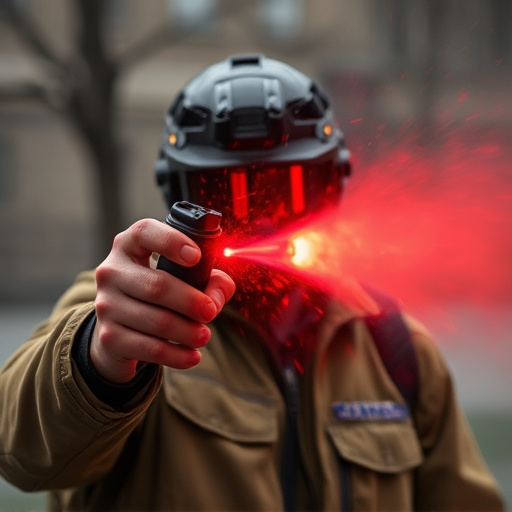Pepper spray, a popular self-defense tool, uses capsaicin from chili peppers to temporarily incapacitate attackers by causing intense irritation. Unlike misconception, it does not cause permanent blindness but reversible effects lasting 30 seconds to several minutes. Civil use is regulated, with strict laws governing application and possession. Misuse can lead to legal consequences. Responsible use requires understanding risks, training in deployment techniques, aiming for face (eyes, nose), and practicing under stress. Regular updates on self-defense tools clarify misconceptions like whether pepper spray can truly blind you.
“Discover the power of inflammatory sprays as a civilian self-defense tool. This comprehensive guide explores ‘Understanding Pepper Spray’, delving into its non-lethal capabilities and how it works to cause temporary blindness, making it an effective deterrent. We navigate the legal aspects of civilian use, providing insights for responsible ownership. Learn essential deployment techniques to ensure maximum protection in potential threatening situations. Understand the mechanism, benefits, and precautions, empowering you with knowledge on this powerful personal defense tool.”
- Understanding Pepper Spray: A Non-Lethal Self-Defense Tool
- The Mechanism Behind Pepper Spray and Its Effects
- Legal Considerations for Civilian Use of Inflammatory Sprays
- Effective Deployment Techniques to Maximize Protection
Understanding Pepper Spray: A Non-Lethal Self-Defense Tool
Pepper spray, also known as oleoresin capsicum (OC) spray, is a non-lethal self-defense tool designed to incapacitate an attacker temporarily. It works by causing a burning sensation and inflammation in the eyes, nose, and respiratory system of the target, leading to temporary blindness, coughing, and difficulty breathing. However, it’s essential to understand that pepper spray is not intended to cause permanent harm; its primary purpose is to give users time to escape from dangerous situations.
Contrary to a common misconception, pepper spray does not blind you permanently. The effects are designed to be temporary, lasting anywhere from 30 seconds to several minutes. This allows individuals to get away from an assailant and seek help. Can pepper spray blind you? In most cases, no—it’s simply a powerful deterrent that gives users the upper hand in potentially life-threatening scenarios.
The Mechanism Behind Pepper Spray and Its Effects
Pepper spray, a civilian protection tool widely used for self-defence, operates on a simple yet effective mechanism. It contains capsaicin, the active ingredient derived from chili peppers, which is highly irritant to the eyes and respiratory system. When sprayed, it rapidly causes temporary disability by inducing lachrymation (excessive tearing), nasal congestion, and severe pain in the eyes, making it difficult for the target to see or breathe effectively. This disruption creates a crucial window of opportunity for users to escape potential threats.
Contrary to common misconception, pepper spray does not cause permanent blindness. While it can temporarily impair vision due to excessive tearing and eye irritation, the effects subside once the spray is cleared from the eyes. However, this temporary blindness can be disorienting and dangerous in certain situations, reinforcing the importance of responsible use and proper training for civilian protection purposes.
Legal Considerations for Civilian Use of Inflammatory Sprays
The civilian use of inflammatory sprays, such as pepper spray, is governed by stringent legal frameworks designed to balance personal protection with public safety. While many states allow citizens to carry pepper spray for self-defense, there are strict regulations regarding its application and possession. It’s crucial to understand that using pepper spray on another person without lawful justification can result in serious legal consequences, including charges of assault or battery.
One common concern revolves around the potential of pepper spray to cause blindness, which has raised ethical questions about its civilian use. Although pepper spray is designed to temporarily incapacitate and disorient a target, it can lead to temporary vision impairment, especially if used at close range or in enclosed spaces. This consideration underscores the responsibility of users to employ such devices only as a last resort and in accordance with local laws, ensuring they are trained and aware of the spray’s capabilities and limitations.
Effective Deployment Techniques to Maximize Protection
When considering an inflammatory spray for civilian protection, understanding effective deployment techniques is key to maximizing its protective benefits. Unlike popular belief, pepper spray isn’t designed to blind—it disrupts the respiratory system and senses by irritating the eyes, nose, and throat. To deploy it optimally, aim for the face, particularly the eyes and nose, where the spray can quickly impair visibility and breathing. A quick, close-range application is usually most effective.
Training is crucial. Practice your target acquisition and spraying technique to ensure precision under stress. Remember, time is of the essence; a well-placed spray can disrupt an assailant long enough for you to escape or seek help. Regularly updating your techniques and staying informed about the latest in self-defense tools will enhance your safety and protection.
Pepper spray, while not a lethal option, can be an effective tool for civilian self-defense. Understanding its mechanism and legal considerations is crucial for responsible usage. By learning proper deployment techniques, individuals can maximize their protection without causing permanent harm. Remember, while pepper spray isn’t intended to blind you, it can significantly impair vision, providing a critical window of opportunity in potentially dangerous situations.
